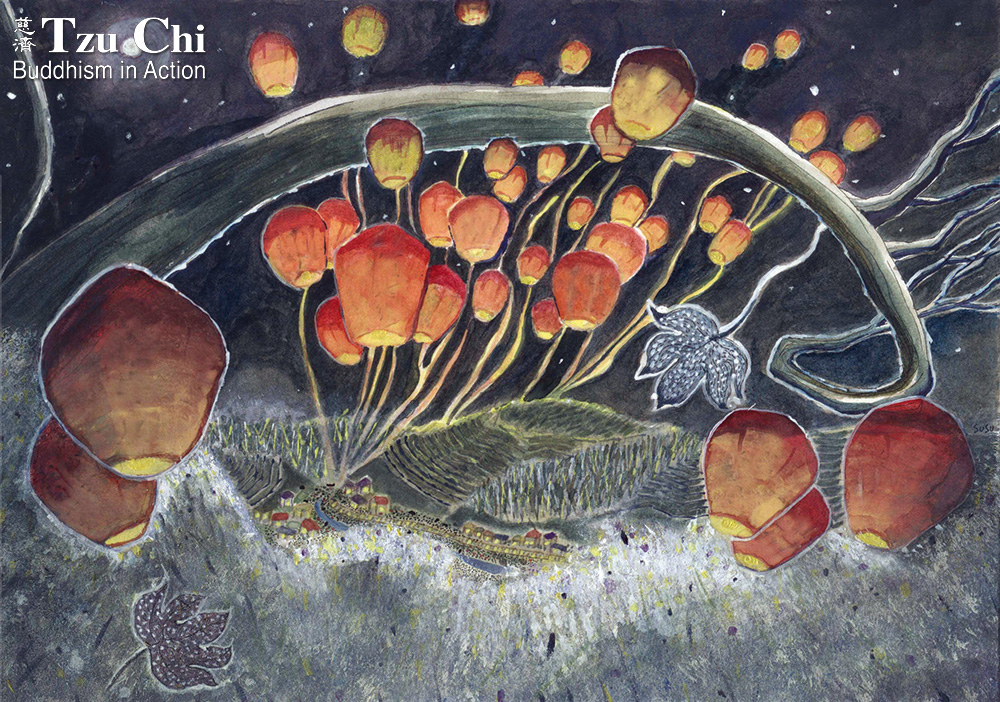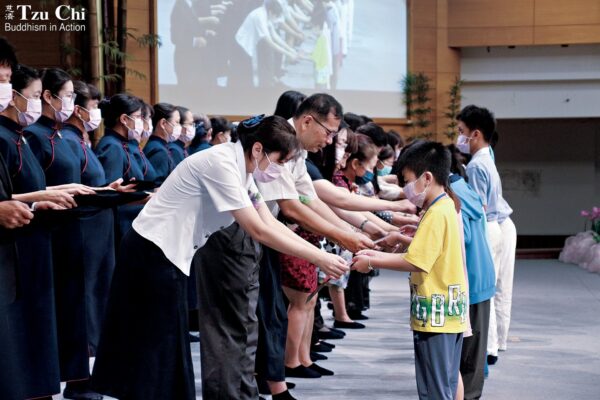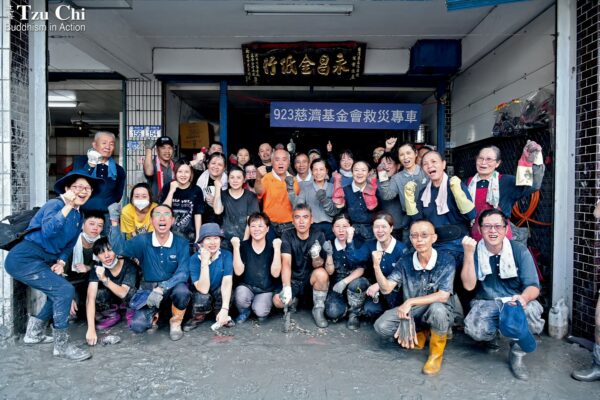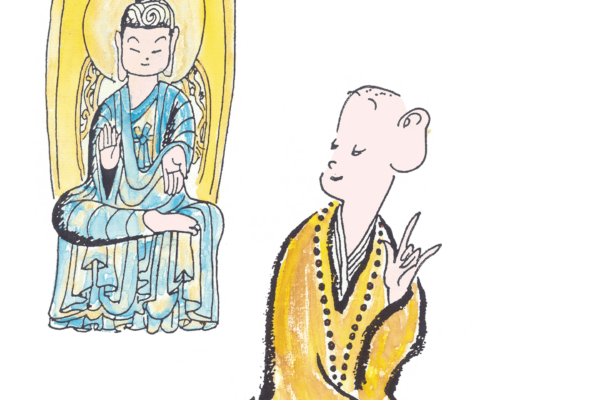By Chen Mei-yi
Compiled and translated by Wu Hsiao-ting
Graphic by Su Fang-pei

In the aftermath of Taiwan’s deadly train crash on April 2, 2021, a group of volunteer mortuary cosmetologists from a non-profit organization called “76 Monks” rushed to Hualien, where the accident took place, to help reconstruct corpses. Members of the organization offer to repair the bodies of those killed in disasters and accidents using their own time and money.
I’m a Tzu Chi volunteer, and often write stories and articles for the foundation’s publications. On April 8, I arrived at the Hualien Funeral Home. In the rest area for journalists at the funeral home, I asked Angela Wang (王薇君), the spokesperson for 76 Monks, how their corpse reconstruction work was coming along. She said, “We were having difficulty mending a victim’s head—her face was badly damaged above the jaw. We originally planned to recreate a head for her, but then a miracle happened.”
“April 5 was one team member’s birthday,” she continued. “We bought a birthday cake for him. The wish he made that day was that we’d be able to restore the cadaver of every deceased victim to great shape.” Less than 30 minutes after he made that wish, a half face was found in a body bag. It looked as though it might belong to the woman. After more than 20 hours of DNA testing, it was determined that it did indeed belong to the woman.
“Heaven above must have heard our prayers,” Wang went on to say. “We recovered not only what the woman had lost in the accident, but also a leg belonging to a man.”
When they were done reconstructing the female victim’s head and applying makeup to her, her family came to claim her. Her mother called out when she was about three meters (10 feet) away: “Yes, that’s my child.” After a closer look, she said, “So beautiful!”
Wang said to the mother, “We’re sorry that you had to wait so long [for her body to be restored].”
“No matter how long we had to wait, this would be the last time we needed to wait for her for anything.” The mother’s words made everyone around tear up.
The work that members of 76 Monks do for families that have lost loved ones is difficult to overstate. Sometimes the body of a deceased person is badly damaged, adding to the pain family members feel upon seeing it. Sometimes the bereaved are so heartbroken upon seeing their loved one’s broken body that they faint. The restoration of a disfigured body to wholeness and its former likeness brings the family of the deceased a lot of comfort. Members of 76 Monks have repaired or reconstructed over 300 corpses since it was founded in 2015.
“Some people think our work unnecessary,” Wang remarked. “They say, ‘Why spend 20 or 30 hours reconstructing or mending a body just to have it cremated soon afterwards?’ But we believe that helping the grieving families find solace matters more than anything else. It’s also our wish that the deceased can leave this world with dignity.”
After the train wreck in April—a tragedy that took 49 lives—more than 100 volunteers from 76 Monks left their jobs and own families behind and threw themselves into helping the deceased and their families. Some worked for 40 or 50 hours at a stretch to repair the bodies. Chen Hsiu-chiang (陳修將), the convener of the NPO, said, “The media said that we worked around the clock to repair the bodies. That’s true, but that doesn’t capture the extent of our effort. They didn’t know that some of our members passed out from fatigue and needed to be put on IV drips.”
The volunteers had no time to spare. Once they started working on a cadaver, they needed to finish their task as soon as possible—the longer they worked, the more the body thawed and deteriorated. They also didn’t want to make the families wait too long. They worked on three or four bodies at the same time, with about six people laboring on the same body. The space in which they worked wasn’t large. When they didn’t have enough tables to carry out their repairs, they put some plastic stools together and placed trays on them to work.
Injuries were inevitable. Some volunteers were pricked by suture needles, jabbed by sharp broken bones, or even cut by the broken glass in the cadavers during the restoration process. But the volunteer cosmetologists paid little mind to their injuries—they just didn’t have the time to spare. They’d just squeeze the blood from their wounds and apply some simple bandaging before resuming their work.
Medical professionals from Hualien Tzu Chi Hospital, concerned about the risk of infection, provided tetanus shots to the cosmetologists who were injured and treated their wounds. They also drew blood from every team member to be tested. They will track the volunteers’ condition for half a year to safeguard their health.
“Tzu Chi has provided us with folding beds so that our team members can lie down for a rest. They need it after working 20 or 30 hours straight,” Wang said. She showed me some photos on her smartphone. In one of the photos, I saw two persons, blankets wrapped around them, sleeping curled up on a bed. The bed wasn’t big, but they managed to squeeze themselves onto it.
Another photo showed one of the volunteers sitting on a box, slumped against a wall, sound asleep. They were working so hard around the clock they didn’t want to return to their free hotels to sleep. Some of them slept in their cars to save time, and others just crashed on-site.
On the morning of April 11, six representatives from the organization visited Dharma Master Cheng Yen at the Jing Si Abode and talked with her for more than an hour. Chen Hsiu-chiang shared with the Master and the others present how their organization had come into existence. In July 2014, a passenger plane crashed in Penghu, off the western coast of Taiwan, killing 48 people. Just a week later, a series of explosions caused by an underground gas leak hit an area in Kaohsiung, southern Taiwan, claiming 32 lives. Chen and 26 other professional morticians responded to both tragedies by rushing to the front lines and repairing—for free—the cadavers of those killed in the accidents. The team restored a total of 76 bodies across the two disasters. Afterwards, they founded 76 Monks, which has been in operation for over five years now.
At first, the organization admitted only other funeral service professionals into its ranks, but now their members include volunteer police officers and firefighters, teachers, nurses, beauticians, and even family members of those killed in accidents who had received their help.
Chen said that he had once been a gangster and had even served time behind bars. “I remember reading Jing Si Aphorisms [a collection of maxims by Master Cheng Yen] and stories about Tzu Chi in prison.” He quoted an aphorism by the Master: “If we look at a chipped cup from another angle, it is still round.” He said that the sentence had a profound impact on him. It inspired him to learn to look at things from another angle. He thanked the Master for planting seeds of wisdom in him.
The Master felt for the team for the hard work they had put in, and expressed appreciation for their services, saying that they were doing things not everyone could do. She also said that their giving brought a lot of comfort to families of the deceased and was truly meritorious.
Ten days after the train crash, the group’s work was coming to an end. At four p.m. that day, a police car and a hearse from Taipei were preparing to transport one of the deceased victims of the accident home. The decedent’s name was Miss Wu. Miss Wu’s family was present, and her aunt took out a necklace and placed it around her neck.
Wu’s body had been badly damaged in the accident, but it had been restored to the best state possible. Moved by the work of the volunteers, Wu’s mother said to Chen and Wang, “I want to kneel in front of you [to express my gratitude]….” Hugs followed. Then the volunteer cosmetologists lined up to see Miss Wu off. As the hearse carrying her body slowly moved away from the site, they bowed deeply as if they were seeing off one of their own family members.
Many people have heaped praise on the cosmetologists, saying that they are truly extraordinary and remarkable. Chen said in response to such compliments, “We are just a group of ordinary people, and what we do is really nothing out of the ordinary.”



